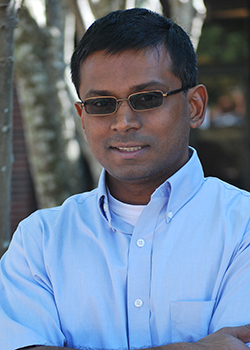LU introduces online Masters of Public Health program
Lamar University’s Department of Health and Kinesiology introduced a new online Masters of Public Health (MPH) program specializing in health disparities this fall.
The program, which is entirely online, allows students of all types to earn a masters degree at their own pace. No classroom learning or on-campus attendance will be required for the students to complete the program.
 “Our program is mainly designed for working professionals—those who are already in their careers and want a tool to give them an edge or to keep them moving up the ladder,” said Praphul Joshi, program director and associate professor of health at LU. “Our target is to recruit professionals in health-related fields, including those employed at public health agencies, non-profit organizations, physicians, nurses, and other allied health professionals as well as students planning to attend or attending medical school.”
“Our program is mainly designed for working professionals—those who are already in their careers and want a tool to give them an edge or to keep them moving up the ladder,” said Praphul Joshi, program director and associate professor of health at LU. “Our target is to recruit professionals in health-related fields, including those employed at public health agencies, non-profit organizations, physicians, nurses, and other allied health professionals as well as students planning to attend or attending medical school.”
The Association of Schools of Public Health (ASPH) estimates that by 2020, the United States will be facing a shortfall of at least 250,000 public health workers. The MPH program is geared toward those who aim at improving the lives of others through public health by building one-on-one relationships, conducting research or analyzing health related data. Many public health related jobs require a graduate degree, and graduate education “provides the skills and knowledge necessary to solve the increasingly complex public health issues facing the country and world,” according to Joshi.
The program has already surpassed expected student enrollment and will be submitted for accreditation this spring, a process that usually takes two years. Students who complete the program prior to accreditation, however, will be considered students of the accredited program after the process is complete.
“It’s a great incentive; once we submit our application we will be listed with the other accredited programs with a disclaimer saying that we are pending review,” Joshi said. “That will give a huge presence for not only this program but for Lamar as well.”
“It’s the first MPH program offered through the Texas State University System,” Joshi said. “There’s a huge need for public health workers; that area just continually grows.”
The need for the program grew from the high rates of chronic conditions in Southeast Texas and large local disparities regarding access to healthcare, Joshi said. Obesity, cardiovascular diseases, diabetes and several forms of cancers, among others, contribute to the health issues of the area.
Currently, no other university in Texas or Louisiana offers a MPH program specializing in health disparities. The degree program will be the first in the area.
“Before now there were no public health degree programs between Houston and New Orleans,” Joshi said. “It’s a vast gap and unfortunately within that gap spans a region with very high incidence of chronic diseases. So you have a lot of need for public health professionals, but no skilled workforce to fill that need.”
Unfortunately, the burden of these chronic conditions is very high among lower socioeconomic populations. Addressing these chronic diseases through culturally appropriate interventions is very critical in bridging the gap between need and care, according to Joshi.
“Beyond socioeconomic and cultural differences in varying groups, we have a more industrial workforce. You have either top executives or you have a lot of potentially hazardous jobs at plants and other places,” he said. “Those executive positions are very few, and those industrial positions are many, which can also pave the way for these kinds of health disparities.”
Focusing on health disparities lets health professionals at all levels better assess the needs of and better understand their patients and the general public, especially those from traditionally socioeconomically disadvantaged demographics. Education efforts, according to Joshi, are important as a forward step to combat these problems.
“The other thing which happens with relation to economic disparity is access for healthcare. For example, somebody who is impoverished isn’t going to go see a physician because they think it’s too expensive, and they’ll wait until the last minute. Sometimes by then it’s too late,” he said. “We don’t have enough of a public health workforce in place to actually educate people and be able to give them the tools to good health. So all of this combined, I think, makes health disparities much worse and that much more important to study.”
Candidates for admissions to the MPH program must meet all admission requirements of the College of Graduate Studies as well as departmental requirements and approval.
The program requires a total of 42 credit hours; 27 hours in core and required courses, 9 hours of advisor-approved electives and 6 hours of culminating experience, or capstone.
For more information, contact Praphul Joshi at (409) 880-8944 or pjoshi@lamar.edu.


